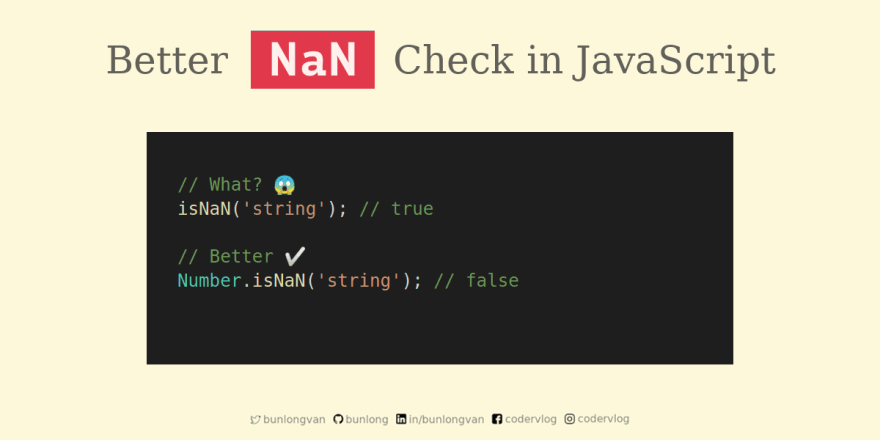
How to Check NaN in JavaScript
What is NaN?
- In JavaScript, NaN is kind of a value (an invalid number).
- NaN stands for “Not a Number”.
- You get NaN when you try to do some mathematical operations on values that are not Numbers.
const invalid = 100 / 'string';
console.log(invalid); // NaN
Problem Checking NaN
isNaN is a very special value that never equals to itself 😫.
const nan = NaN;
console.log(nan === NaN); // false
console.log(nan == NaN); // false
Luckily, JavaScript created the global utility isNaN to help us check if a value is equal to NaN.
Problem with isNaN
But there is the problem with isNaN as well when using with String type.
const nan = NaN;
console.log(isNaN(nan)); // true ✅
const value = 'string';
console.log(isNaN(value)); // true 😱
isNaN returns true if the argument equals to NaN, and otherwise returns false. And it tries to convert the argument’s type into a Number type.
const value = 'string';
console.log(Number(value)); // NaN
When you try to convert the String type to a Number type, it returns NaN. That’s why isNaN('string') it’s returning true.
Problem Solved with Number.isNaN
That’s why the Number.isNaN method was introduced. It doesn’t try to convert the argument’s type to a Number type.
const number = 100;
isNaN(number) // false ✅
Number.isNaN(number) // false ✅
const nan = NaN;
isNaN(nan) // true ✅
Number.isNaN(nan) // true ✅
const value = 'string';
isNaN(value) // true ❌
Number.isNaN(value) // false ✅
Summary
When checking if a value is equal to NaN. Use the Number.isNaN method. Do NOT use isNaN 🤓
Thanks for reading ❤
Say Hello! Twitter | Github | LinkedIn | Facebook | Instagram